Businesses looking for the right e-commerce platform for their needs have to take many factors into account. From the level of customization involved, to the ease of use for both shop owners and their customers, to the payment processors used and other integrations available, the many e-commerce offerings online today range vastly, meaning businesses will have to take a good look at what will best meet the needs of their specific organizations.
For businesses with a large inventory of products for sale, inventory management is key when searching for the proper platform. The best e-commerce platforms for large inventory will be able to host many product listings at once, seamlessly track inventory levels, and make running a large inventory business both easy and straightforward for business owners.
With this in mind, below are some of the best ecommerce platforms for large inventory businesses, and why they’re best fit to handle this type of product inventory.
1. BigCommerce
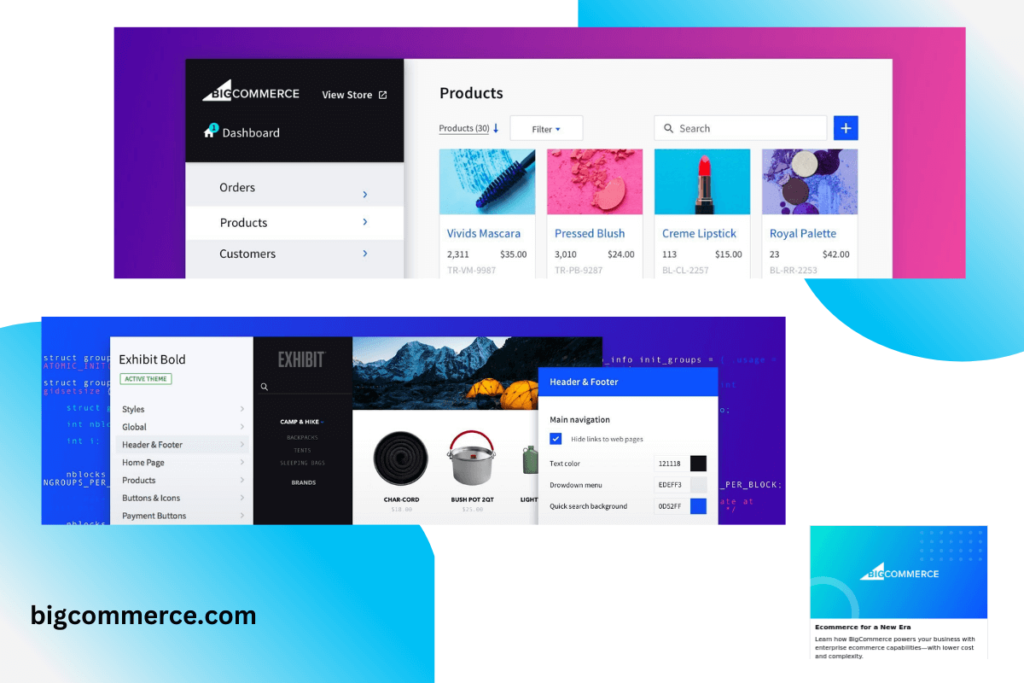
BigCommerce knows a thing or two when it comes to managing large inventory. After at, it’s the trusted platform for household names like Ben & Jerrys, Skullcandy, Black Diamond, Bliss, and Burrow. Providing the tools businesses need to build, innovate, and grow, the BigCommerce platform makes it simple for businesses on the larger end to handle all aspects seamlessly, and for up and coming businesses to evolve and scale without hassle.
Why it’s great: The BigCommerce platform is built to make managing businesses of all sizes seamlessly run their digital storefronts easily and effectively, but it takes this to the next level with its ultra high-speed capabilities and growth-forward thinking.
Some of the top features include blazing-fast store speed with Google Cloud platform infrastructure, Google AMP, and Akamai Image Manager already built in. SEO tools such as optimized URLs, out-of-the-box metadata, and robots.txt editing make it easy for products to be found by consumers. Vendors can also create and offer more than 70 different native discounts and promotions with no coding skills required.
Digital wallets make the checkout process a breeze as well, thanks to integrations with top payment methods such as Apple Pay, Amazon Pay, One Touch, and more.
BigCommerce also offers specialized support for businesses needing to transition their existing shops from another platform, sof if you’re looking to move your storefront to a provider that can handle growth and larger inventories with ease, this is a great one to consider.
How much does it cost? Prices start at $29.95 per month.
2. Shopify
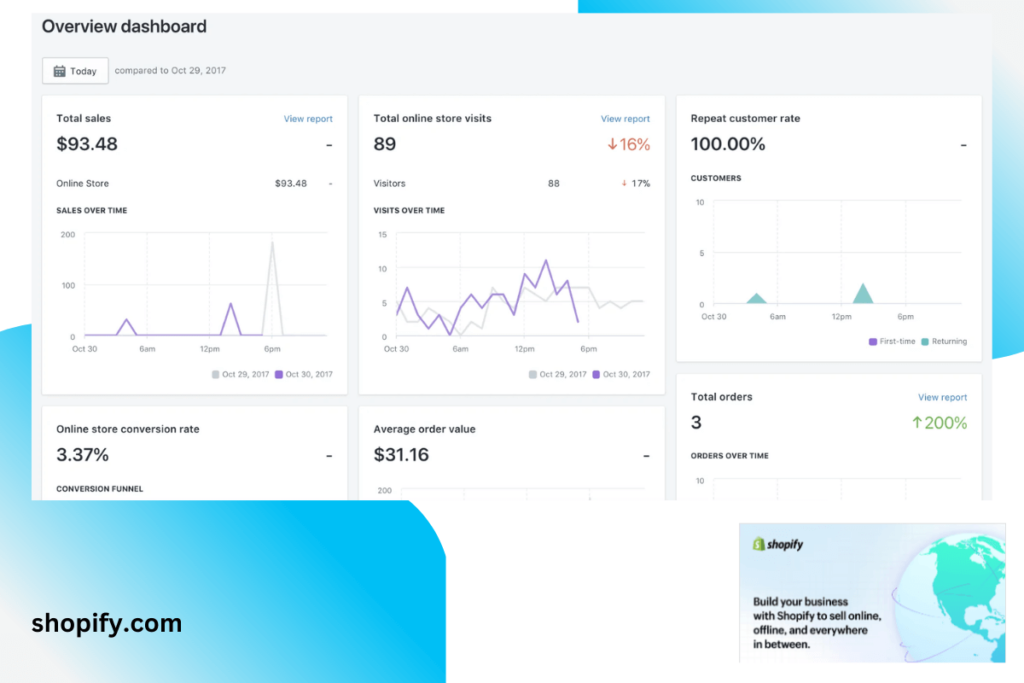
Shopfiy is an industry leader in e-commerce, often landing itself on lists of the best e-commerce platforms for just about any business size or business need. Thanks to its incredible flexibility and wide array of offerings to suit any type of storefront, the platform is capable of hosting even multinational corporations as well as businesses with a large amount of inventory or a high number of product listings.
Why it’s great: Shopify is trusted by more than a million companies globally, and accounts for more than $200 billion in sales across 175 countries. With such a global reach, this cloud-based, multichannel platform allows its merchants to design their storefronts from the ground up. They are armed with intuitive, user-friendly tools to choose every aspect of their website, making it feel totally branded and completely custom without the need for development or design skills.
For businesses selling their inventory across a wide range of platforms, Shopify seamlessly integrates products and maximizes cross-selling. Vendors can easily cross-list products onto other platforms like Facebook, Amazon, and even mobile apps in order to support increased sales.
Shopify’s wide range of accepted payment methods, ranging from Paypal and Apple Pay to direct payments like credit cards, and its ability to process multiple currencies, makes the checkout process a breeze for shop owners and their customers. Customer experience is always prioritized.
For business owners looking to outsource work or take on additional projects, the Shopify Experts Marketplace enables businesses to connect with industry leaders, freelancers, and agencies for everything from support and guidance to hiring for projects.
How much does it cost? Prices start at $29 per month.
3. Weebly
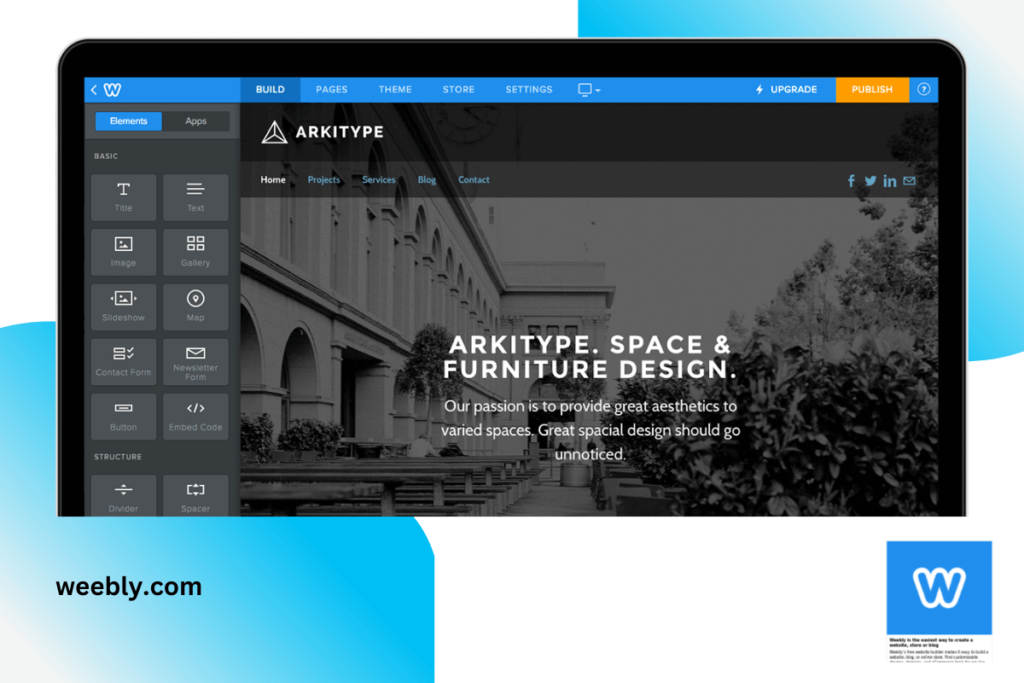
Weebly is a go-to platform for businesses looking to launch an e-commerce storefront without spending massive amounts of capital to get it up and running. Don’t let this deter you if your business handles large inventories, however. The platform is powered by payment industry leader Square, so it’s primed and ready for big sales numbers and high transaction trends.
Why it’s great: Weebly’s payment platform is a highlight, thanks to its ownership by Square, so business owners can rest easy knowing that even with a high number of purchases of large transactions, the checkout experience will be reliable, fast, and seamless. Weebly offers various trustworthy payment gateway integrations ranging from Stripe and Paypal to Square itself.
And just because a business has a large quantity of inventory doesn’t mean they’ll have a web developer on board, and Weebly understands that. That’s why the platform offers several customizable themes with a drag-and-drop build feature, making it easy for anyone using Weebly to make a professional looking site that functions well, too.
Marketing tools enable businesses to grow and scale exponentially, and include turnkey templates for email marketing purposes, with options for everything from welcome emails to abandoned cart emails, helping merchants convert more sales on site visits.
How much does it cost? Basic use of the platform is free, and tiered pricing options are available for all businesses and budgets ranging from $6 to $26 per month.
4. WooCommerce
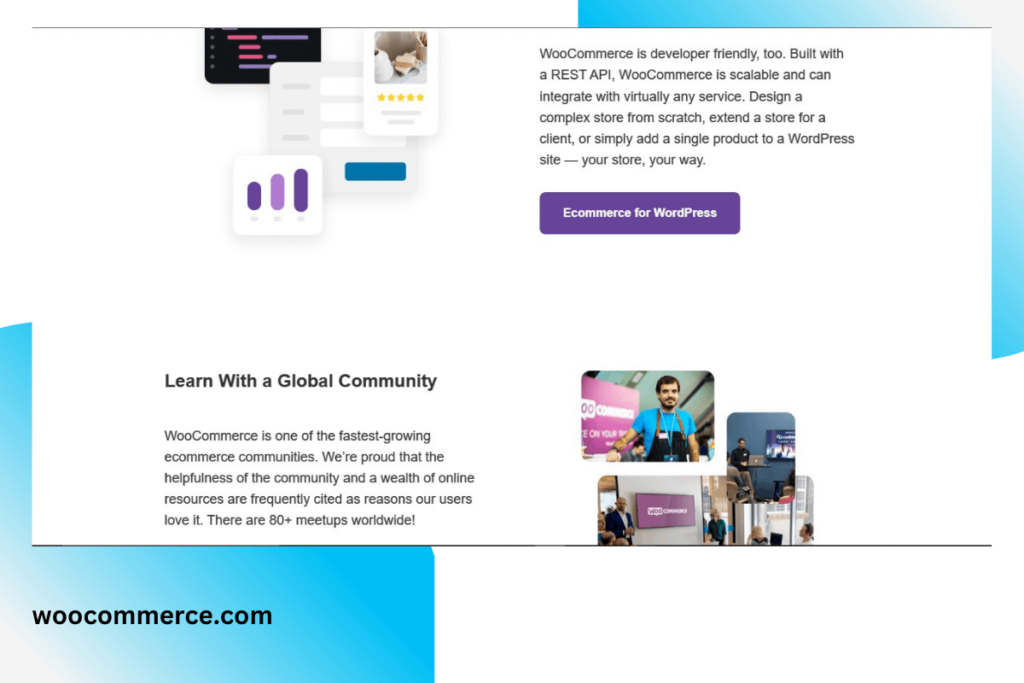
For established businesses looking to add e-commerce functionality, or for businesses looking to streamline their e-commerce capabilities and website hosting all under one roof, WooCommerce is a top choice. That’s because it’s designed as a plugin for WordPress. Since many established businesses host their sites on the WordPress platform, it’s never been easier to manage their storefronts under the same dashboard.
Why it’s great: WooCommerce is fully customizable. Store owners can add on features as business needs change and grow, without the need to start over from scratch or uproot their storefronts to another platform. WooCommerce provides ultimate customization and scalability, so merchants have the opportunity to design for their needs, from making their site feel fully branded and unique, to adding products as they go. The design features are user-friendly, too, so no high-tech coding experience is necessary to find success.
Different types of businesses will have different needs when it comes to features and add-ons, which is why WooCommerce gives its merchants the ability to extend their stores’ functionality with official extensions in the WooCommerce marketplace. This includes payment gateways like Stripe, Paypal, Square, and AmazonPay; marketing extensions like Mailchimp, Facebook, Hubspot and Pinterest; shipping solutions including discounted shipping labels, USPS integrations, table rate shipping, and drop shipping; and many more.
WooCommerce also offers an exciting community of experts and experts who share valuable insights and resources, offer services to improve your e-commerce platforms, and host meetups around the world for networking, education, and more.
How much does it cost? The plugin itself is free, and there are some free themes available with limited functions. You can purchase templates and different add-ons to customize your storefront, and WooCommerce charges a small fee per transaction.
5. Wix
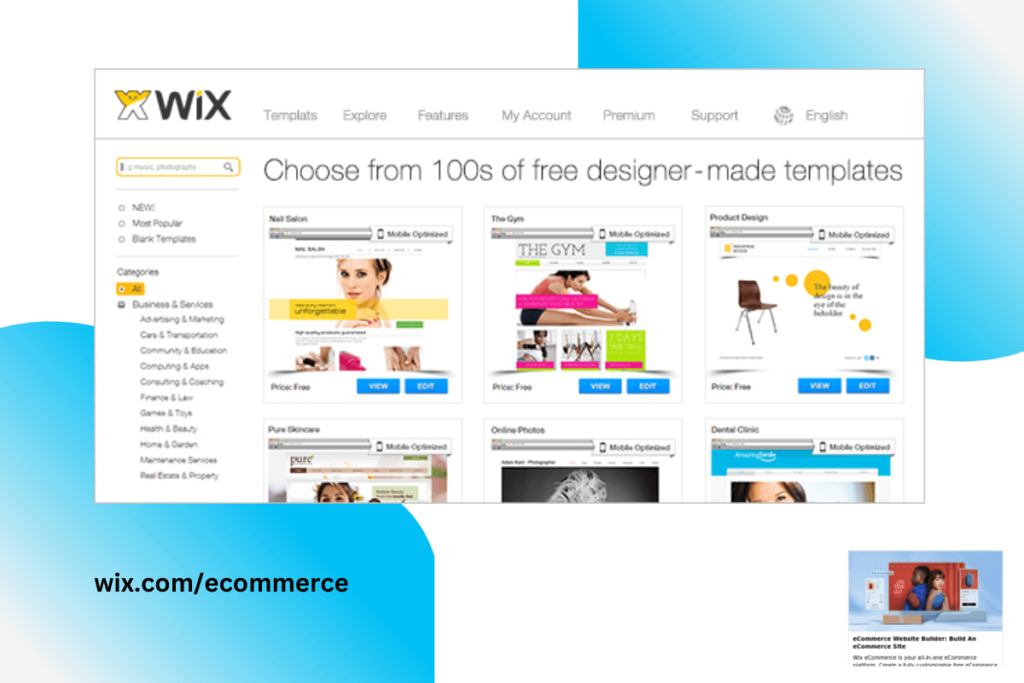
Wix is one of the world’s leading website building platforms, making it a trusted resource for businesses with an e-commerce presence. And don’t let the platform’s easy design features and affordable prices deter you if your business is on the larger end – the platform hosts million-dollar enterprises seamlessly and is designed to work with even the largest inventories and customers bases.
Why it’s great: The easy-to-use platform, available as a free add-on in the Wix app marketplace, allows businesses to create fantastic looking websites with custom product pages and multi-channel integration. The site offers more than 500 designer-made store templates for business owners to get started quickly and easily. All templates are totally customizable, or for those wishing to build upon their unique vision, they can start from scratch and use Wix’s user-friendly drag-and-drop build feature to customize every aspect of the site.
Selling anywhere is easy. Merchants are able to accept all major credit cards and can integrate top payment providers like Paypal, Stripe, or Wix Payments for a seamless checkout experience and trusted security measures. Wix also enables shop owners to send automated emails, from abandoned cart notifications to seasonal sales announcements and discount offers, right from the platform to increase sales turnover.
How much does it cost? Pricing for Wix sites with e-commerce functionality starts at $23 per month.
6. Magento
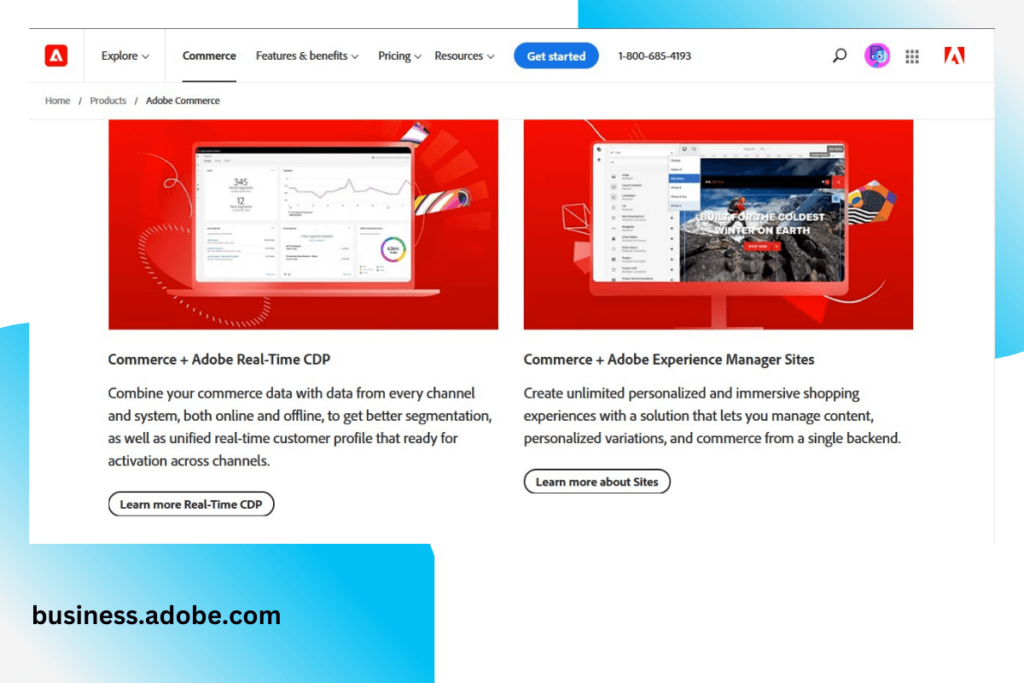
Magento is software giant Adobe’s answer to the e-commerce space, which has been around for more than a decade. Its storied history of success in hosting online shops for even the biggest companies makes Magento a go-to for businesses with large inventory thanks to advanced design tools, SEO features, and open scalability.
Why it’s great: Magento is an open-source e-commerce solution that prioritizes SEO, which enables merchants maximize their visibility and increase sales exponentially. The platform’s business intelligence gives merchants unmatched insights into their business health, enabling them to monitor everything from average order value, to customer lifetime value, to retention rates and more from the dashboard. Visualization tools also make it easy for business owners to turn this data into shareable information, in the form of pre-built reports and visual data that can be presented and shared.
Magento offers the ability to fully customize and continually update your storefront, with an expansive marketplace of plug-ins, extensions, and add-ons. Even the most complex businesses can bring their storefronts to life, and thanks to the platforms focus on streamlining commerce growth, merchants can scale and expand as much as they need or want to match customer demand, without the need to worry about outgrowing the platform or slowing down business processes to keep up.
While the platform is best for those more comfortable in the development space, Magento’s customer support is unlimited, and backed by the tech industry experts at Adobe, so questions and roadblocks can be handled with ease.
How much does it cost? Pricing varies greatly based on business needs.
As a business, growth and success is typically the goal, and finding the right e-commerce platform to get you there is key. For businesses with large inventories especially, it’s essential to find a platform provider that is able to keep up with inventory management and a high number of transactions to ensure a smooth user experience on both the customer end as well as the merchant end, and ultimately help businesses to run successfully,
So, if you’re a business with a large inventory searching for the right e-commerce platform to suit your needs, consider these platforms as a jumping off point to your research. By identifying exactly which features matter most to you, and which e-commerce platforms offer the best array of services within your budget, you’ll be able to land successfully on the platform that’s best to host your business.
